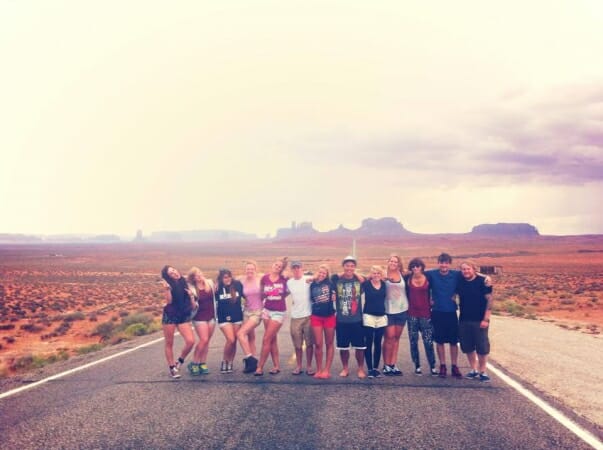Gap in the Market Volume 9 - Gap Year Travel
That's right. It's 2017 and our Gap in the Market series is back with a bang. If you're new around here, this series is our chance to dig deeper into a specific travel niche. We've already covered a number of potential sectors that would-be travel startups might want to explore, from Staycation travel to wellness retreats and food tourism. This week we're taking a closer look at the world of Gap Year travel.
What is Gap Year travel?
While Gap Year travel might seem like a tourism fad that's only been around for a few years, it's arguably more established than many of the sectors we have previewed before. It seems to be a case of the label being newer than the product. And that's partly because the term 'Gap Year travel' is so all-encompassing - it means different things to different people.
So here's our definition. Gap Year travel typically refers to big trips that people take out at a specific time in their lives. You might have also heard the term 'Year Out' - we think the two are pretty synonymous. This kind of travelling usually takes place for younger people before or after university, and is characterised by the sense that there's nothing really tying them down. It's the perfect time for an adventure.
Having said that, this doesn't mean that older people don't get in on the action too. More and more people are deciding to take sabbaticals, Gap Years or 'Years out' - whatever you want to call them - despite having established careers and plenty holding them back on paper.
So it seems that there's an obvious demographic split here. On the one hand, you have carefree young adults looking for an adventure before life really begins, and on the other you have 30, 40 and 50 somethings looking to take time out from their careers. So what do they have in common?
Two different stages in life, one shared purpose
To understand why Gap Year travel continues to appeal to people of different generations, you need to look closer at what they have in common. Gap Year travel isn't like your standard 10 days on the beach, it's about so much more than that. It's about travelling with a purpose, experiencing something beyond what you're used to and returning home a better person as a result. Some of the top reasons that people take Gap Years are:
- To gain skills
- To develop as a person
- To do something fulfilling
- To help others
- To try something new
- To experience a different culture
- To get away
Many of these motivations can be broadly applied to travel itself. But Gap Year travel satisfies them in a way that your average beach holiday does not. Gap Year travel, whether volunteering in an African wildlife reserve or supervising kids at an American summer camp, is as immersive as it gets.

There are two main reasons that Gap Year travel represents a lucrative opportunity for marketplace startups. The first is that there's a huge variety of options for people to choose from. And the second is the overwhelming and continued demand for trips of this kind. Together this is a potent combination, with agencies offering bespoke trips, experiences and even acting as go-betweens in the recruitment process for volunteer and paid positions abroad.
A Gap Year is travel in its purest form
In researching this week's travel sector, we got in touch with two leading organisations in the world of Gap Year travel. The first is Camp America, which has been arranging for young people from all over the world to travel to the US and work in summer camps since 1969. The second is One World 365, a UK travel agency specialising in Gap Year travel, unique trips and life-changing experiences.
We asked both companies why they think Gap Year travel is so unsurprisingly, both responses revolved around similar themes. Paul Edwards, CEO of One World 365, said "A gap year is appealing for so many reasons. It offers the chance for people to try something new, explore new destinations, experience new cultures, meet new people and escape their normal routine. Gap Years are obviously popular with students but with professionals, too – we find that no matter what age, or stage of your life you are at, there will be a trip or experience which will make you want to book a flight."
Katy Phillips, Marketing and Communications manager at Camp America, also highlighted the cultural opportunity that comes with Gap Year Travel, which is a two-way exchange for Camp America's recruits. "Taking a Gap Year is a hugely popular experience for young people today," said Phillips. "Being able to take a year out and be immersed in another culture for a short time is something that is incredibly fulfilling for many. We strongly believe that cultural exchange programs such as ours are extremely beneficial in helping create knowledgeable global citizens with positive cross-cultural relationships."
How the Gap Year travel market is evolving
Gap Year travel has been happening for years, but what was once exclusively a pre-university adventure for those with deep enough pockets has fast become established, accepted and accessible to the mainstream. This is in part due to the rise in working holidays, such as those offered by Camp America, which provide the experience, accommodation, travel, and necessities in return for a work placement. Travellers are now returning with money in their pockets and impressive additions to their CVs.
As well as more people embarking on short-term work abroad as part of their Gap Years, the traditional pre-university demographic is also shifting. "In recent years we have seen more and more older people taking time out," said One World 365 CEO Paul Edwards. "We now receive a lot of enquiries from Brits in full-time employment, especially those in their 30s who didn't take the traditional gap year before and after university but are now booking gap years and sabbaticals."
Edwards believes that the concept of a Gap Year has become more accepted around the world, and points to the news from across the pond that Malia Obama announced she is taking a gap year before attending Harvard University. "We are also receiving more enquiries about working holidays - gap years can be expensive when you calculate flights, travel, accommodation and meals, but working abroad on a gap year can help alleviate the costs."

Will uncertain political times hit Gap Year travel?
Even a travel sector that exists to provide the kind of escapism many of us long for can't hide from the tumultuous events of 2016. Speaking with Travelshift, both Camp America and One World 365 voiced concerns at the current political landscape and how it might turn people off what has been a thriving corner of the travel industry.
Read more: How will President Trump Affect the Travel Industry?
Camp America's Katy Phillips believed the company hadn't been hit by the recent Presidential election and its generally negative tone. This is probably a testament to the strength of the Camp America brand and the openness and outward-looking objectives that it obviously stands for. It will be interesting to see how this develops over the coming years. "Despite a controversial election campaign in America, we are happy that it hasn’t deterred the thousands of young people who are still excited to experience working and travelling in America this summer," she said.

One World 365 CEO, Paul Edwards, was less optimistic in his outlook, particularly as his UK-based agency will have to come to terms with an exit from the European Union and a falling Pound that's set to make travel more expensive for British tourists.
"Brexit could have a devastating effect on the travel and gap year industry. For example, travelling abroad is now more expensive for Brits due to the sinking pound value against worldwide currencies, so not everyone can afford it. Brexit will also make it more difficult for UK citizens to work, study and travel in Europe. There is also the rising cost of tuition fees and rents in the UK, which means students especially have less money to take gap years."
"Political change in other countries may also have an impact – for example, there might be restrictions on visas to work in the USA which will influence on traditional gap year jobs like working in American summer camps."
What does the future hold for the world of Gap Year Travel?
So that's the past and the present covered? What shifts do our experts anticipate in the months and years to come? What should operators new on the scene be looking out for?
"Rather than just booking tours," Edwards said, "we are finding more people are looking to take constructive gap years - booking courses, internships and volunteer programs. This can add value to your CV and help build personal and professional experience. We think it’s due to people being increasingly aware of the competitive job market and how a gap year spent getting drunk in Thailand for example, doesn't look like time well spent in the eyes of employers."
But it's not just the attitude toward travel that's changing for Gap Year takers, the destinations are changing too. "Lesser-visited countries which are a little off the beaten track are now becoming more and more popular compared to well-established destinations. For example, there are now hundreds of gap year programs in China which offer something different to backpacking in South-East Asia."
Camp America's Katy Phillips also said that travellers are increasingly looking for something tangible to take away from their Gap Years. "We have been told that people want more ‘real’ experiences, where they can live like a local and gain something valuable, such as a new skill, from their gap year."
Thinking of setting up a Gap Year travel marketplace?
It's clear that the Gap Year travel sector will continue to appeal to young people and middle-aged wantaways. The only question is whether travel operators can keep putting together offerings that tick all the right boxes. Those that are dedicated to specific niches, such as Camp America, have a genuine chance of building an established brand and becoming the go-to source of work, accommodation, flights and even complete packages.
If you're looking to target a broader range of Gap Year trips, you'll need to clearly separate yourselves from the rest of the pack with genuine adventures that will stick in travellers' minds forever. Easier said than done.
Here at Travelshift we're all about building travel marketplaces that work. With our software solution, you can easily aggregate travel providers into a single marketplace and combine the power of your sellers' offerings to shout louder than any of your competitors. Get in touch with us today to find out more.
-----
Many thanks to Camp America and One World 365 for their contributions to our in-depth look at Gap Year travel.